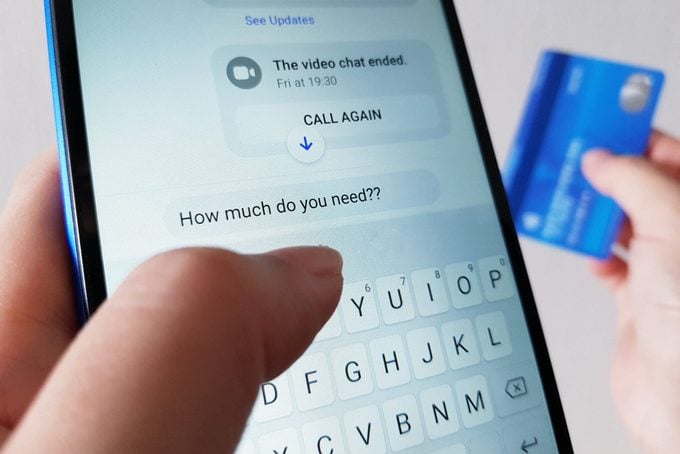How to Spot Military Romance Scams: 13 Telltale Signs to Watch Out For
Updated: Nov. 08, 2023

Military romance scams are on the rise, so stay up to date on these common cons—and learn how to protect yourself
Before you go all-in on your relationship with that soldier stationed abroad, know this: Romance scams, specifically military romance scams, are increasing, and the objective isn’t love—it’s money. According to the Federal Trade Commission (FTC), there were nearly 70,000 cases of romance scams in 2022, with losses reaching as high as $1.3 billion. And that’s just what’s reported; the actual number is likely much higher.
The truth is, everyone is susceptible to online scams, and military romance scams can be hard to detect. After all, when someone has catfished you, they’ve created the persona of your ideal match, and their love bombing can feel like the attention you’ve always craved. “Soldiers are stuck in faraway lands, risking their lives to protect the rest of us,” says Donna Andersen, founder of Lovefraud.com and author of Red Flags of Love Fraud. “We’re already primed to trust and feel sorry for them.”
Thankfully, there are steps you can take to protect your money—and your heart. Familiarizing yourself with common military cons is a good place to start.
Get Reader’s Digest’s Read Up newsletter for more tech, humor, cleaning, travel and fun facts all week long.
How do military romance scams work?
Con artists pretend to be in the military so they can target people who support the armed forces, pulling their heartstrings and manipulating them out of money. “Scammers typically find an authentic soldier’s social media page, and as they work on seducing you, the scammers keep sending pictures,” Andersen says. “The sheer volume of pictures creates the illusion that you are communicating with the soldier. All that’s needed is a little nudge, and you fall in love and send money.” Despite how simple the method sounds, there’s more that goes into military romance scams. Here’s a more detailed overview:
The scams occur online
Military romance scams typically happen online, where it’s easier to fake an identity—but they can happen in real life too. “My ex-husband claimed to have served with the Australian military in Vietnam, joined Vietnam Veterans of America and was the keynote speaker at a Veterans Day event,” Andersen recounts. “He walked my dog every day wearing his military beret, but it was all fake. He was never in Vietnam. He was never in the military. He forged all the documents. But by claiming to be military, he surrounded himself in a mantle of respectability, which helped in his efforts to scam me.”
They have complex backstories
Online scammers work in a similar way, assembling complex backstories and supporting documents, and they assume the identity of an actual military person by using stolen photos of them in uniform, on foreign soil, receiving an award and more. “They’ll pretend to be in love with you right away, deployed and unable to see you, which fits their narrative conveniently,” says matchmaker Susan Trombetti, CEO of Exclusive Matchmaking. “And then they hit you for money—asking for gift cards and wire transfers—while attempting to get control of your bank account.”
They have multiple targets
Military scams are complex and take a lot of effort to put together, so scammers target multiple individuals at once. “The con artist behind the fake profile is usually a group of cons from a foreign country,” Trombetti says. Military romance scams can show up on any dating or social media site, but Facebook seems to be the king of con artists posing as military men. “I have had so many, but usually by the end of the day, Facebook has removed their profiles,” she says.
They target women more than men
A 2022 poll by Social Catfish, a company that verifies online identities to prevent catfishing, found that 78% of romance scam victims surveyed were women. Savvy scammers will look for single women in their 40s and 50s who support the military, which can be easy to figure out through social media.
For example, Olayinka Ilumsa Sunmola, now serving a 27-year sentence, created fake dating profiles—one was an American soldier stationed overseas—that he used to con women out of millions of dollars. “Sunmola concentrated on women, typically those recently widowed or divorced and often over 50,” explains Lisa Schiller, director of investigations and communications for the Better Business Bureau of Wisconsin. “He often used the name and picture of a colonel in the U.S. Army stationed overseas.”
What are common examples of military romance scams?

If you want to protect yourself from military romance scams, start by understanding the types of fraud to help figure out if a solder is real or fake. Being aware of common romance scammer stories will make you more skeptical the next time a so-called service member strikes up a conversation on social media or a dating app.
Asking for money for food and housing
This is usually the first step in military romance scams and a red flag that your new beau isn’t being honest. In other romance scams, it’s plausible that your new love really does need funds for basics like food. But if someone claims to be in the service, know that the military always provides housing and food for soldiers. Don’t fall for this phony plea.
Asking for money for a plane ticket
Military romance scammers will ask for money for a plane ticket to visit you. If you send money for this, you’ll never see it or the soldier, and you’ll likely never hear from the con artist again. One thing to keep in mind: The military always provides transportation for active service members.
Asking for money for “leave requests”
Some military romance scammers will ask for money for “leave requests.” The scammer may tell you it’s a “little-known fact” that the military makes soldiers pay to go on leave, but it’s far from a fact.
Asking for money for early retirement
Fraudsters will tell you they want to retire early because they can’t wait any longer to be with you. Don’t fall for this lie. Soldiers don’t have to pay to retire early.
Asking for money for medical treatment
Your soldier may tell you he’s been badly injured and needs money to pay for the treatment of combat wounds. He might even say it’s a matter of life and death. The goal is to heighten your emotions and get you to act on impulse, a likely reaction considering you’re bound to be in love by this point. Of course, it’s a total lie. The military provides medical insurance for soldiers as well as their children and dependents.
Asking for money for their loved ones at home
Your supposedly deployed love interest will tell you that a loved one needs financial assistance for an operation or money for prescriptions. Their mother has cancer, they need money for a caregiver—both are common requests from romance scammers. What makes military romance scams so effective is that the victim feels bad (and obligated to help) because the love interest is protecting our country.
Telling you they’re cut off from their bank
Scammers may tell you the military won’t let them access their personal bank account, which is another lie. The military can’t cut someone off from their own money. They may also tell you that the person they trusted at home to handle their paychecks stole from them.
Asking you to send money or goods to a third party
Your scammer may ask you to send money or goods to someone else. If they ask you to buy something, it will most likely be a luxury item or the latest technology, such as an iPhone or Mac computer, which can be easily resold. The scammer will ask you to send it to a third party in a different country, a sure sign that this is a scam. They’re likely working with other con artists.
Asking you to send gift cards
Fraudsters may ask you to send gift cards to their children or other family members for birthdays or other special occasions. Gift card scams—and, for that matter, Cash App scams—are commonly coupled with romance cons, including military romance scams.
Requesting help with moving costs
The military member you’ve been dating online is finally moving back to the United States. Good news … or is it? Chances are, this twist in the story marks a new request for money—for so-called moving costs, for instance, or rent. But the U.S. Department of Defense provides relocation allowances to high-level military members (which these scammers all claim to be), even paying for food and accommodation while transitioning from one place to another. In short, this story doesn’t hold water.
Telling you they’re on a covert mission
This is one of the easiest ways to identify a scammer. Scammers like to use this one because it gets them out of phone and video chatting, but anyone who is really on a secret mission doesn’t have time to be on dating apps and wouldn’t risk his safety and reputation by telling a stranger.
Requesting help with moving money
Your true love has come across a big chunk of change and needs your help getting the large sum of money out of the country in which he’s deployed. Should you assist? That’s a definite no. Deployed soldiers do not “find” large sums of money, and even if they did, they wouldn’t ask someone they met on a dating site to help them move the money out of the country.
Requesting money for jewelry
In what they hope you’ll believe is an act of kindness, military romance scammers say they have a special piece of jewelry for you. The catch? They need money to pay a diplomat to deliver it to you. This isn’t something that would ever happen and is a huge red flag.
How to protect yourself from military romance scammers

One way to protect yourself from military romance scams is to do a reverse search on their images and check the GPS coordinates. “Sometimes that will reveal where they really are located if they took the photo but didn’t strip the coordinates,” Trombetti says. “Also, if they stole the photo from a real person’s social media, you may catch the scammer that way.”
Rori Sassoon, a relationship expert, author of The Art of the Date and co-owner of matchmaking agency Platinum Poire, suggests an even deeper dive. “If you feel like their story is not adding up, check to see if they really are part of the military,” she suggests. “You can implement the Defense Manpower Data Center’s Military Verification Service.”
Military romance scammers are easy to spot once you know what to look for, and you can protect yourself by taking these steps:
- Never share your bank account information. Your military lover will ask for your bank account info so they can deposit their check into your account and you can pay their bills. “This is just an attempt to hit your bank account,” Trombetti says. “Never give out your bank account information to anyone.” Be wary of bank scams, and don’t give out information that could compromise your digital wallet.
- Don’t send money or items to third parties. Scammers will ask you to send money or packages to third parties, telling you they can’t receive mail because they’re deployed overseas. The catch: All U.S. service members have an APO or FPO mailing address. Avoid sending them anything—you’ll never see the money again.
- Be suspicious of text-only communication. All romance scammers resist talking on the phone for as long as possible, and military romance scammers are no exception. Even soldiers in combat zones can make phone calls. There’s a reason these con artists keep to text: They might not be the nationality they claim to be. It’s also easier to get caught in lies on the phone.
- Watch for spelling, grammar and language errors. The person you’re communicating with may say he’s an American soldier but in reality he could be a scammer in an internet cafe in another country. If their syntax and grammar suggest they’re not a native English speaker but they claim to be American, that’s a major red flag.
- Consider who’s doing the talking. Scammers are great at asking questions but not so skilled at answering. “If you begin asking a series of detailed questions about their service with minimal responses, there are two logical explanations behind the vagueness,” warns Sassoon. “Either they have PTSD or are filled with lies.”
- Ask for their class number. If your new love claims to be a U.S. Navy SEAL, as many do, here’s an easy way to spot a fake: Ask him his class number. “All SEALs must complete Basic Underwater Demolition/SEAL [BUD/S] training,” Andersen says. “A true SEAL never forgets his class number.” Scammers, however, will claim they forgot their credentials or class number—because they never had ’em.
- Check their email address. Everyone in the military has a “.mil” email address, and anyone who meets a military person on a dating site should ask them to send an email from that address. Soldiers who don’t use a military email address (or refuse to send you an email from one) are probably con artists in disguise.
- Be suspicious of related military contact. In military romance scams, someone claiming to be higher up in the military will contact you to validate the soldier. This is not a common or accepted practice and would simply never occur in any branch of the military. If it happens to you, cease contact with your online beau—he’s a con artist.
- Never send money. As with all online scams, one tip holds true: Never, ever send money to someone you met online. No matter how much you love them or how much they claim to need the cash, this is never a good idea.
- Trust your gut. If something seems off about your paramour, trust yourself and get out before you’re left with nothing.
How to report military romance scams
While it may seem logical to report military scams to the Army’s Criminal Investigation Division, these scammers aren’t actually military members, so there’s nothing the Criminal Investigation Division can do—it only investigates within the armed forces.
What you can do is report military romance scams to:
- The dating app or social media site where you met.
- The Federal Trade Commission.
- The FBI’s Internet Crime Complaint Center.
- If your scam led to identity theft, head to IdentityTheft.gov to report the crime and recover from it.
- The U.S. Army’s Criminal Investigation Division suggests reporting Nigerian scams by email to [email protected]. You can also alert Nigeria’s Economic and Financial Crimes Commission.
- If you feel too spooked to report anything online, you can report by mailing a letter to Identity Theft Clearinghouse, Federal Trade Commission, Washington, D.C. 20580.
- If you feel more comfortable reporting by phone, call 877-ID-THEFT (438-4338) or TTY 866-653-4261.
About the experts
- Donna Andersen is the founder of Lovefraud.com, a website dedicated to teaching others about romance scams and how to avoid them. She is also the author of Red Flags of Love Fraud, a book that outlines how to recognize social predators and their tactics.
- Susan Trombetti is a matchmaker and CEO of Exclusive Matchmaking, where she and her team pair singles based on similar interests, life goals and aspirations.
- Lisa Schiller is the director of investigations and communications for the Better Business Bureau of Wisconsin. She specializes in white collar crimes and investigates consumer scams and trends.
- Rori Sassoon is a relationship expert and author of The Art of the Date, a guide to dating and choosing a long-lasting relationship. She is also the co-owner of the matchmaking agency Platinum Poire.
Sources:
- Federal Bureau of Investigation: “How a Romance Scammer Stole Over $700,000”
- U.S. Department of Justice: “‘Prince Charming’ Behind Bars: Nigerian Romance Scammer Nets 27-Year Prison Sentence”
- U.S. Army Criminal Investigation Division: “Impersonation, Fraud & Romance Scams”
- Social Catfish: “State of Internet Scams 2022”
- Federal Trade Commission: “Romance Scammers’ Favorite Lies Exposed”



